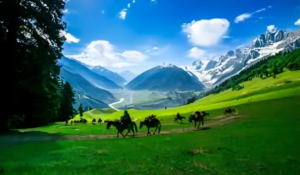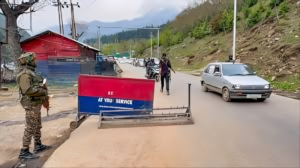The Rising Tensions: Tragic Attack on Tourists in Kashmir
Introduction
Earlier this week, a group of international tourists visiting the picturesque valleys of Kashmir fell victim to a sudden, violent assault near a popular trekking route. The incident has sent shockwaves through local communities, shaken confidence in regional safety, and reignited longstanding geopolitical tensions between India and Pakistan. In this article, we explore what happened, why it matters, and how stakeholders—from authorities to travelers—are responding in real time.

Background: A Region on Edge
Kashmir has long been a flashpoint between India and Pakistan, with both nations claiming the territory in full. While periods of relative calm have allowed tourism to flourish—drawing hikers, photographers, and culture enthusiasts—sporadic violence has remained a risk. Over the past year:
- Cross-border skirmishes have increased along the Line of Control.
- Pro-government and separatist demonstrations have occasionally turned violent.
- Security deployments have fluctuated, affecting local perceptions of safety.
Understanding this backdrop is essential for grasping why an attack on foreign visitors has such far-reaching implications.
Incident Details
Late on July 1, around 6 PM local time, a convoy of three jeeps carrying tourists from Europe and South Asia was ambushed on the Mughal Road, a historic pass connecting Shopian and Poonch districts. Key facts:
- Location: Near the Serwah tunnel, approximately 10 km from Shopian town.
- Casualties: Five tourists sustained injuries; two critically.
- Perpetrators: Unidentified armed assailants fled into nearby forests.
- Response time: Local police and paramilitary units arrived within 30 minutes.
Eyewitnesses describe a rapid exchange of fire before the attackers disappeared under the cover of dusk. Local hospitals have declared a heightened alert for incoming patients.
Impact on Tourism and the Local Economy
Tourism is a lifeline for many Kashmiri families—providing jobs in hospitality, guiding, transportation, and handicrafts. The attack threatens to undermine months of recovery after pandemic‑related downturns. Key concerns include:
- Booking cancellations: Several international tour operators have paused departures.
- Hotel occupancy: Pre‑monsoon bookings dropped by nearly 40 % in the last 48 hours.
- Local livelihoods: Guesthouse owners and guides fear long‑term loss of income.
Why This Matters
- Community resilience: Earnings from tourism fund schools, clinics, and road maintenance.
- Cultural exchange: Tourists bring global perspectives and appreciation for Kashmiri heritage.
Security Measures Underway
Authorities have swiftly implemented multi‑layered security protocols to restore confidence:
- Increased patrols:
- Joint operations by Jammu & Kashmir Police and Central Reserve Police Force (CRPF).
- Foot patrols and drone surveillance along key trekking paths.
- Checkpoints and permits:
- Mandatory registration for all foreign visitors at designated police stations.
- Random vehicle inspections on major and minor routes.
- Community engagement:
- Local “citizen watch” committees mobilized to report suspicious activity.
- Information hotlines established in English, Urdu, and Kashmiri.
Authorities have also launched a 24/7 traveler assistance center, offering logistic support and medical guidance.

International Reactions
Governments and travel advisories around the world have responded with caution:
- United Kingdom: Updated Kashmir travel advisory to “exercise increased caution.”
- United States: Urged citizens to avoid non-essential travel to Jammu & Kashmir.
- European Union: Condemned the violence and offered consular assistance.
Major airlines serving Srinagar Airport have released statements assuring customers of continued service while monitoring security developments.
Real‑Life Perspective: A Traveler’s Story
Emily Watson, a British photographer, arrived in Srinagar just two days before the attack. She shares:
“I’d always dreamt of capturing the Dal Lake sunrise and hiking through pine‑fringed valleys. After hearing the news, my heart sank. But local friends reassured me: ‘This is an isolated incident—Kashmir welcomes you.’ Their warmth reminds me why we travel: to connect, to learn, and to stand together in the face of fear.”
Her experience highlights the resilience of Kashmiri hosts and the importance of responsible travel—preparing thoroughly yet staying engaged with local culture.
Looking Ahead: Balancing Adventure and Awareness
For prospective visitors, here are practical tips to stay safe while experiencing Kashmir’s beauty:
- Plan with trusted operators: Ensure they have valid licenses and a proven safety record.
- Register early: Complete all police and embassy registrations before arrival.
- Stay informed: Monitor local news and subscribe to alert services.
- Pack essentials: First aid, portable charger, and satellite messenger if venturing off-grid.
- Respect local customs: Build goodwill by learning basic Kashmiri or Urdu greetings.
By combining vigilance with cultural sensitivity, travelers can reduce risks and foster positive exchanges.
Conclusion
The recent attack on tourists in Kashmir is a stark reminder that even the world’s most idyllic destinations can harbor danger. Yet the swift response by authorities, the solidarity of local communities, and the resilience of travelers all point toward a collective determination to move forward. As Kashmir navigates this crisis, the global community must support efforts to ensure both security and sustainable tourism. By staying informed, respecting local norms, and prioritizing safety, visitors can continue to explore Kashmir’s breathtaking landscapes while standing in solidarity with its people.